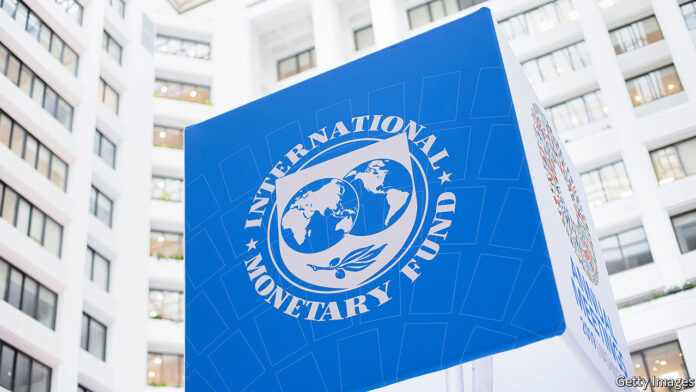On October 27, the International Monetary Fund agreed to grant Egypt a loan of $3 billion in an extended credit facilitation program under a 46-month arrangement, bringing the country’s total loans from the IMF since 2016 to $23.1 billion, making it the second largest country indebted to the fund in the world after Argentina.
The Egyptian government indicated that “the agreement on a 4-year program, within the framework of a $3 billion credit program, provides additional financing of $1 billion from the Resilience and Sustainability Fund, and $5 billion from international institutions.” Egypt had asked the fund in the negotiations, at the beginning of last October, for a loan of $12 billion. Still, the fund reduced the loan’s value to $3 billion because Egypt did not comply with its conditions.
The fund conditions were to liberalize the dollar’s exchange rate, the state’s exit from the economic sectors ultimately, and reduce subsidies to the maximum extent possible. At the same time, Egypt agreed to the first condition and established a more flexible exchange rate policy but objected to the other states, so the fund reduced the loan. Indeed, the total loan should give the certificate of confidence before international debt securities markets and international and regional donors. Hence, the devaluation of the loan overshadows Egypt’s international financial stand.
Worsening debt
Tons of goods have accumulated in Egypt’s ports, as their owners cannot take them out due to the lack of dollars. Some reports estimate their value at $5 billion, which has increased commodity prices and decreased the purchasing power of citizens. Also, some productive activities that depended on raw materials from abroad, most notably poultry and livestock feed, and the actions based on it were stopped. A recent study prepared by the Japanese Bank Nomura stated that seven emerging economies had been severely pressured during the past months. The worst country was Egypt, as the value of their currency is likely to decline significantly against the dollar. “Egypt, which has already dramatically devalued its currency twice this year and has pursued an International Monetary Fund program, has now the worst currency performance among emerging economies,” the study said.
The Egyptian Central Bank had lowered the dollar’s exchange rate for the second time this year, causing the Egyptian pound to lose 20% of its value before the second liberation and 36% since the beginning of the year. The Egyptian Central Bank also announced Egypt’s direction towards permanent flexible exchange rate policies. However, bankers spoke to Reuters about the exchange rate, saying, “The black market rate for the Egyptian pound is from 26 to 26.5 pounds to the dollar, still 8% lower than the official rate of 24.53 pounds to the dollar.” Spokespeople told Reuters that Egypt is more likely not to pay its debt than Pakistan, which is facing a significant economic crisis “with debt interest payments set to take more than 40% of government revenue next year, and a foreign currency shortage, which continues to hurt the economy, investors remain cautious despite the high hopes after the Egyptian government’s agreement with the IMF. This prompted Fitch’s credit rating agency to amend Egypt’s credit rating from stable to negative early last month. And set it at (B+).
Structural problems
Bloomberg published an analytical article that read, “By approving a $3 billion loan to Egypt, the International Monetary Fund once again missed an opportunity to pressure General Abdel Fattah al-Sisi’s government to free the economy from the grip of his army.” The article emphasized that the agreement with the IMF did not “address the main weakness of the Egyptian economy: the excessive presence of the Egyptian army in almost every important sector, from infrastructure and housing to hotels, and in some unimportant sectors, such as bottled water.” With this intervention, the article explained: “Sisi worked to discourage entrepreneurship and investment in the private sector.”
The article suggested that lending to Egypt, at best, gives it “a temporary relief from the damage inflicted on its economy since the start of the Russian invasion of Ukraine, which has led to an increase in import costs and made foreign investors in a state of alarm.” However, in its opinion, the war is not Egypt’s problem but rather a structural defect in its economy, and “Egypt’s long-term economic well-being depends on building a strong private sector, without the army.” In an interview conducted by Michael Young, managing editor of the Malcolm Kerr Center, with Yezid Sayegh, a senior fellow at the Carnegie Endowment for Middle East Affairs, the latter referred to the report issued by the World Bank, the IMF’s associate, in July 2021, which for the first time drew attention to ” The share of the military in the production of capital goods, consumer durables, apparel, materials, food, beverages, tobacco, automobiles and spare parts, retail, media and entertainment, semiconductors, ITS equipment, hardware, and technological equipment.”
He stated that the IMF’s inclusion of military companies in its assessment of public sector companies represented a vital tip-off that “these companies should also be included in the process of concentrating state property in one entity.” However, “there is no evidence that the IMF specifically addressed military companies in its recent negotiations with the Egyptian government,” which Sayegh sees as a missed opportunity to liberate the Egyptian economy from the army’s grip.
Obstacles before the governmental plan
At the end of last October, less than a week before its agreement with the IMF, the Egyptian government held an economic conference to discuss solutions to the financial crisis with experts, business people and civil society. The conference concluded its activities with several recommendations to the government, most notably accelerating the process of the state’s exit from 79 economic sectors in what was known as the “State Ownership Policy”.
According to a report from the Carnegie Center on the conference, researcher Antonio Constantine believes that the meeting “yielded a good list of recommendations. But the government’s ability to implement this long list in the coming months is uncertain.” He stated that the conference “basically paved the way for promising economic reform, but it is costly, difficult, and cumbersome. The proposed policies need time and resources that may not be available due to the requirements of reform conditions.” He added that the conference “does not present new ideas, as several recommendations were discussed before in a similar conference in 2015.”
The Financial Times, on November 1, in an article by the expert Andrew England, asked about Sisi’s ability to wrest the economy from the hands of the Egyptian army. England believes: “The only hope for saving the country is for the Egyptian Regime to reduce the military’s role in the economy and boost the performance of the private sector”. And she warned that if the situation continues as it is, “the Egyptians will go to the Paris Club to ask for help, and they will be forced to accept values less than the actual value of their assets, and the assets will be sold, and this may lead the country to bankruptcy.”
African Business interviewed Robert Springborg, a researcher at the Italian Institute of International Affairs, assistant professor at Simon Fraser University, and one of the most prominent specialists in Egyptian affairs. The Italian expert pointed out Egypt’s economic crisis is represented in “its need for about $50 billion from now until the end of 2023 to pay interests and instalments of the foreign loans.” The government, explained Springborg, depended on “selling sovereign treasury bills with high interests” to acquire its greenback needs.
Springborg believes that the relatively small loan provided by the International Monetary Fund, in addition to the depreciation of the currency and the growing trade deficit, increased “the possibilities for the influx of foreign money from Egypt’s allies to save it. Among the most important of these countries are the United Arab Emirates, Saudi Arabia, Qatar and Kuwait, along with regional development banks”. But “even with the support of these allies, the economic situation will remain dire for several years to come”. Springborg said, “Parts of military companies that benefit from broad franchises are being sold to foreign parties, which would provide the military with side benefits through joint ownership, such as access to Gulf markets.” However, he stressed, “Even if a large share of the companies owned by the army is sold, the army acts as a gatekeeper for the government, and therefore its main role in the economy, and in determining who benefits from government resources, will not change.”









